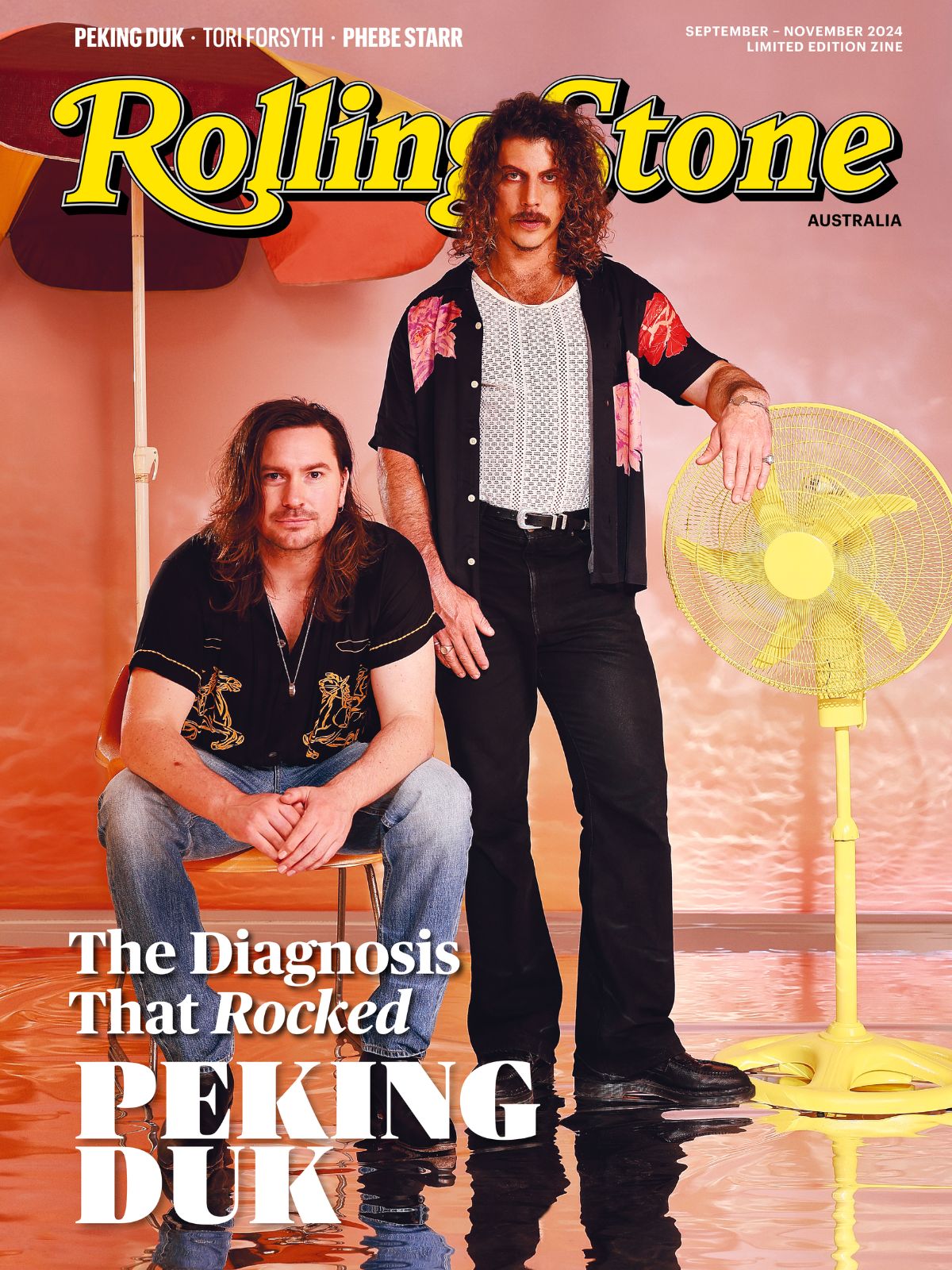Credit: Michelle Pitiris
The Diagnoses That Rocked Peking Duk
“I’ve had friends that I’ve lost to cancer,” Adam Hyde says. “Skin cancer is just so common in Australia. It’s almost absurd at this point.”
In Partnership with Cancer Council Victoria
Four or so years ago, Adam Hyde — also known as Keli Holiday, one half of the acclaimed music duo Peking Duk — took a trip to the doctor for a skin check-up.
It was something that Hyde had gotten into the habit of, in part as a reaction to his less than sun-safe childhood: he had spent his formative years “skateboarding in the hot Canberra sun,” his hair shorn into a short mohawk, and neglected, as a young man, to properly wear sunscreen.
“That’s what has led to millions of moles, spots and freckles all over my skin,” Hyde says now.
Hyde’s doctor spotted something “a little suss” — an unusual mole. He cut it out, and a little while later, while on tour in New York, Hyde received a startling email. “It said, ‘Melanoma in situ’,” Hyde says. “When I read those words, I was like, ‘Oh god.’”
The melanoma was treated, but a few years later, in the early months of 2024, Hyde spotted another unusual lump. “I could feel something in my neck — it felt a bit different. It looked like a pimple, but I knew it wasn’t a pimple, because it didn’t hurt.”
The news came back that it was cancer, again. Following a successful excision, Hyde is now cancer-free — but the incident made him painfully aware of the importance of sun safety and getting to know your own skin, always watching for unusual changes.
Love Music?
Get your daily dose of everything happening in Australian/New Zealand music and globally.

“I’ve had friends that I’ve lost to cancer,” Hyde says. “Skin cancer is just so common in Australia. It’s almost absurd at this point.”
Hyde now knows that when it comes to skin cancer, spotting it early and speaking to your doctor can save your life.
“But if you catch it early and as long as you’re on top of it. That’s the most important thing.”
Hyde isn’t an outlier, either: almost one in two Australians will be affected by cancer in their lifetimes. It’s a shocking stat and one that Hyde’s musical partner, Reuben Styles, also knows the reality of. “Personally, I lost my grandfather a number of years ago to bowel cancer,” Styles says. “It was a really tough time.”
Styles speaks movingly about the loss, and in particular, how it impacted his grandmother. “I can imagine as the dust settled, the loneliness would have really kicked in for her. Just the little things: there’s that same table [where they sat] for so many years.”
“She’s the strongest person I have ever met in my life,” Styles says “Losing your life partner to cancer – that would be the worst thing in the world for me.”
It’s not the only loss due to cancer that Styles experienced either. “My friend Jamesy, who was very young, passed away a few years ago. [He was] the same age as me. It was pretty crazy to think that someone my age was taken away by cancer.”
That now is one of the core messages that Styles and Hyde both want to impart to Australians – that cancer is not an old person’s disease. It’s painfully prevalent, and its impact is real. “I always wear sunscreen now,” Hyde says, a man who understands the many levels of sun safety, from properly covering yourself to limiting time in direct sunlight. “It’s a wise warning for everyone to get checked, because you never know.”
“We are so prone to getting absolutely ruined by the sun,” Styles agrees. “So we need to take it seriously. It’s very easy to laugh it off, and say, ‘The sun’s good for you, but in the Summer you can go to the beach for an hour, and you’ve overexposed yourself ten times.”
Covering your skin by wearing proper amounts of sunscreen as well as a hat, sunnies, protective clothing, seeking shade, acting with caution, and looking after yourself — these are the steps that Peking Duk together encourage all Australians to take. And, importantly, knowing your skin and getting checked if you notice any changes or anything unusual. “Sure it’s a little daunting,” Hyde says, “but what’s more daunting than finding out you have cancer?”
If you or someone you know has cancer, get free confidential support from a cancer nurse, call 13 11 20.



































